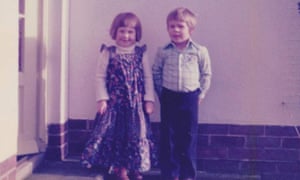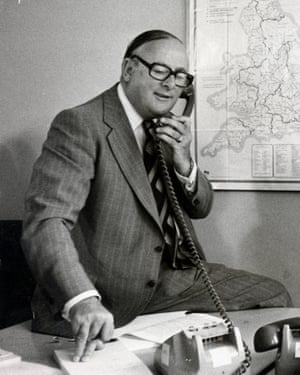1976 匯率:1英鎊約72~70 台幣
"In 1976, the average house price was £12,704. The average wage was £72 a week. A pint of beer cost 32p. A loaf of bread was 19p."
It was a summer of two major firsts in my life. One, I got engaged to George. Two, I soiled myself rather spectacularly in a public place for the first and (I hope) last time. Both events brought with them the most extreme emotions I had ever experienced: deep joy and hot shame. I was three years old.
It was the warmest summer on record, and my mother was heavily pregnant with a baby I did not want. What child wants less of their parents’ attention? I wanted all of it, and it was very difficult to get the attention of adults that summer. My life was about to change for ever, and I didn’t like it.
It was the best of times. It was… well, officially, it was just the best of times: 1976 was dubbed the UK’s best ever summer while we were still in it. Later, it was crowned the best year ever: in 2013, in an economic survey that analysed 17 countries from 1950 to the present day, 1976 was judged the year the UK reached its “genuine progress indicator”, a measure considered more accurate than GDP. We’ve never topped it since.
In 1976, the average house price was £12,704. The average wage was £72 a week. A pint of beer cost 32p. A loaf of bread was 19p. Half the population owned a telephone, by which I mean a landline. (Ours was a cream one, placed on a special table in the hall.) In January, the first commercial Concorde flight had taken off. The Rolling Stones were on tour and playing to 200,000 at Knebworth. Underdogs Southampton FC had just beat Manchester United in the FA Cup final. Earlier in the year, John Curry won a gold medal at the Winter Olympics in Innsbruck. If you were British, you were a winner.
To be a child that summer was an extraordinary thing, all Space Hoppers and backies on Raleigh Choppers. But it wasn’t all good in our house. I was aware of adult tempers fraying, and I was aware for the first time that maybe grownups weren’t in control of everything. They certainly weren’t in control of the weather (highs of more than 28C for a record-breaking 22 days, the hottest summer for three centuries).
All my memories were heightened by what came afterwards, by which I mean my sister. It wasn’t until I had my own three children that I realised how momentous the arrival of a sibling is for a first-born (and, to a lesser extent, for subsequent children). Ask any child about the worst day of their life and they will reply, “The day my sister/brother was born.” For me, the whole summer of 1976 was a prelude to that moment.
I remember the soiling because it happened towards the end of June, and it was already very hot. Tabloid images showed women in crochet bikinis lounging on balconies overlooking Hyde Park, making “the most of the heatwave”. I just made the most of my dungarees.
On the day in question, I was wearing a pair for the first time and against my will. I did not know how to undo them; I had made this clear and I had been made to wear them anyway. (This, at least, is my version of events.) I was at playgroup with my neighbour Debbie, who was also my best friend. Debbie looked like an elf crossed with a pixie, never brushed her hair and always wore a nightie. Her favourite thing was to daub her artwork as thickly as possible with paint, let it almost dry, then pick it off and eat it in the car on the way home. Debbie was the one who raised the alarm.
How can I remember all this? Because there was a lot going on, because my baby sister was coming and because it was so, so hot. And anyway, if Brian Blessed can remember being born (he can! he burst through ice and boulders!), then I can remember being three.
As it happens, Blessed was starring in I, Claudius and Z Cars. The second series ofThe Good Life had just finished and my mum and I would do impressions of Penelope Keith saying, “Jerry!” (we both still speak exactly like Margo Leadbetter). Elton John and Kiki Dee were at number one with Don’t Go Breaking My Heart for six whole weeks.
I hadn’t thought about Debbie or the dungarees for years, until a photograph surfaced on my Facebook wall a while back. I am wearing a long, flowery dress and have a pudding-bowl haircut. I have a fat little face and scrunched-up, button eyes. I am standing next to George, my fiance and nextdoor neighbour, who is wearing flares and a checked shirt with big lapels.
This was the boy I was meant to marry. I asked him that summer, and he said yes. (He did not know about the dungaree incident.) The picture was taken before the heatwave, because we’re both in long sleeves. No one would have made us wear them to protect us from sunburn, because no one cared about sunburn, the only precautionary measure being a knotted handkerchief on my grandad’s bald head.
I hadn’t seen George’s face in 40 years, yet when he found me on Facebook and posted that photo, I was right back in 1976: beakers of warm squash, shallow baths to save water – and the ladybirds. Oh goodness, the ladybirds. Swarms of them crossed the country, more than 23bn of the seven-spotted variety across the southern and eastern coasts of England. All the plants had died early and there was nothing left for the ladybirds to eat. There were reports of them “attacking humans”, as they tried to rehydrate by drinking people’s sweat.Still the mercury climbed. The tarmac on the M1 melted. There were forest fires in Dorset. People queued at standpipes in the streets. BBC weatherman Michael Fish later claimed that this summer was one of the first indicators of global warming. My mum got more pregnant. The minister for drought (yes, a real thing), Denis Howell, suggested people pour washing-up water into the toilet instead of flushing and “take a bath with a friend”. But I did not want to take a bath with Debbie. For 15 consecutive days, between 23 June and 7 July, the temperature reached 32.2C somewhere in England; on five of those days, it exceeded 35C. Parts of south-west England went with no rain for 45 days in July and August.
My mother’s hellish pregnancy got more hellish. I was intentionally annoying, and very particular about my birthday cake: it had to be a cottage with piped roses around the door, and a thatched roof made from Cadbury’s Flakes. My mum had to prop up the back of it with a milk bottle and put it in the fridge to keep it from melting.
Meanwhile, at least on the surface, there was a feelgood factor in the rest of the country. The first branch of the Body Shop opened. Brotherhood of Man won the Eurovision Song Contest with Save Your Kisses For Me, the bestselling single of the year. The Ford Fiesta was launched, creating more than 3,000 jobs. Pat Phoenix returned to Coronation Street as Elsie Tanner after an absence of three years. You might have craved a Phasar digital watch. At the cinema, you would have watched Taxi Driver or The Omen.
There were low points, too, some of them strikingly close to the issues that have bubbled up post-Brexit. There were more than a million people unemployed, public sector strikes, an economy that needed to borrow billions from the banks, unrest and protests linked to Northern Ireland (12 IRA bombs had exploded in London in January), rioting at the Notting Hill Carnival.
There was also a new prime minister: James Callaghan took over after a Labour leadership contest, the previous prime minister, Harold Wilson, having exhausted himself arguing the case for Europe. An extraordinary documentary about immigration was released in the cinemas: Ben Lewin’s Welcome To Britainfocused on new arrivals at Heathrow, usually holders of British passports, wrestling with the UK’s byzantine immigration system: “The visitors mostly come from India, Pakistan and Cyprus, and are treated like criminals,” ran the voiceover. Behind the Scorcher Britain headlines, all was not rosy.
It was becoming less so at home, too. In August, mum learned that the baby was breech. I remember the heat, her anxiety and the grass turning very yellow. If only the baby could turn around, then everything would be OK. But I realised that mum did not think the baby would turn.
My grandparents were struggling to keep their grocer’s shop afloat, a place they had run for 30 years. (I would go to live with them if things got difficult with the baby.) The supermarkets were starting to take over, and they couldn’t compete – not globalisation exactly, but an early version of it. Within two years, they had shut up shop.
Suddenly, the weather broke. In the last week of August, thunderstorms hit and an exceptionally wet autumn followed. Denis Howell was renamed the minister for floods. My sister, the breech baby who refused to turn, was born at the end of September, with a dislocated hip. My parents were told that she might never walk, that she might have one leg shorter than the other; even if she did walk, she would have a limp.
Had I wished ill upon the baby? Was it my fault? It had been bad already, but I had made it worse. I was sent away to live with my grandparents, a relief after the tense, hot summer months, even if I was physically separated from my beloved George.
In the event, and this took around a year to work itself out, my sister turned out fine. She was in plaster for 12 months, but it worked. I did not have to live with the knowledge that I had crippled her for life by wishing that she were not born and it would just be about me and only me for ever.
Things did not work out as I had hoped between George and me, despite our Hula Hoop engagement rings. My parents and I moved away the following summer, and I never saw him again, except on Facebook. He now has a very cool job in the music industry and travels the world managing The Mission. I don’t think our marriage would have been plain sailing, but our love is for ever sealed in that perfect moment, the one beautiful and uncomplicated thing that happened that summer. And, obviously, I have never made any of my children wear dungarees.
• Send us your photos and memories of the summer of 1976 and we’ll publish the best, guardian.com/witness. Viv Groskop is performing her new show, Be More Margo, at The Stand Comedy Club, Edinburgh, from 4-28 August.
Then
Politics
Harold Wilson steps down after the European Economic Community referendum success, claiming “exhaustion”. James Callaghan wins the leadership contest.
Fashion
Patchwork denim, Scholl sandals, denim cutoffs, flares, maxi dresses.
Sweets
“Fry’s Turkish Delight: full of eastern promise.”
MusicThe Beach Boys dominate the album charts for 10 weeks with 20 Golden Greats.
Pointless crazeThe Space Hopper.
SportSouthampton FC beat Manchester United in the FA Cup final. Björn Borg wins Wimbledon for the first time.
Harold Wilson steps down after the European Economic Community referendum success, claiming “exhaustion”. James Callaghan wins the leadership contest.
Fashion
Patchwork denim, Scholl sandals, denim cutoffs, flares, maxi dresses.
Sweets
“Fry’s Turkish Delight: full of eastern promise.”
MusicThe Beach Boys dominate the album charts for 10 weeks with 20 Golden Greats.
Pointless crazeThe Space Hopper.
SportSouthampton FC beat Manchester United in the FA Cup final. Björn Borg wins Wimbledon for the first time.
Now
Politics
David Cameron steps down after the vote to leave Europe, claiming “failure”. Theresa May steps up without having to fight a leadership contest.
FashionBomber jackets, white leather trainers, denim cutoffs, flares, maxi dresses.
Sweets“Haribo: you’ve got Tangfastic face.”
MusicDrake’s One Dance tops the singles charts for more than three months.
Pointless crazePokémon Go.
SportEngland’s footballers are humiliated at Euro 2016. Andy Murray wins Wimbledon for the second time.
David Cameron steps down after the vote to leave Europe, claiming “failure”. Theresa May steps up without having to fight a leadership contest.
FashionBomber jackets, white leather trainers, denim cutoffs, flares, maxi dresses.
Sweets“Haribo: you’ve got Tangfastic face.”
MusicDrake’s One Dance tops the singles charts for more than three months.
Pointless crazePokémon Go.
SportEngland’s footballers are humiliated at Euro 2016. Andy Murray wins Wimbledon for the second time.



沒有留言:
張貼留言